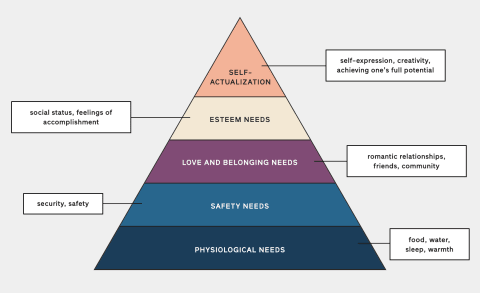Advertisement
How To Achieve Self-Actualization: 19 Traits Described By Psychologists


While needs like shelter, food, and water are the most important pieces to survival, what comes once you have those things? What about when you want to not just survive but thrive, reaching your greatest potential? Achieving self-actualization is about doing just that.
What is self-actualization?
Put simply, self-actualization occurs when you fully meet your needs and reach your full potential, meaning you're doing everything that you're capable of doing.
You may have heard the term self-actualization before in reference to the completion of psychologist Abraham Maslow's hierarchy of needs, but the term was first introduced in the early 20th century by Kurt Goldstein, a physician specializing in neuroanatomy and psychiatry. He saw it as the end goal for each living being, believing that each action taken was connected to that goal. However, the concept didn't become popular until Maslow began to explore the concept.

As discussed in his 1943 writing titled "A Theory of Human Motivation1," Maslow also believed that people, not all living things, would motivate themselves to achieve self-actualization only after their basic needs were met. In his book Motivation and Personality, Maslow explains it like this: "Musicians must make music, artists must paint, poets must write if they are to be ultimately at peace with themselves. What human beings can be, they must be. They must be true to their own nature. This need we may call self-actualization… It refers to man's desire for self-fulfillment, namely to the tendency for him to become actually in what he is potentially."
Self-actualization was further studied by psychologist Carl Rogers. Unlike Maslow, who saw self-actualization as one of many human motivators, Rogers saw self-actualization as our only motivator. "The organism has one basic tendency and striving—to actualize, maintain, and enhance the experiencing organism," he wrote in his work, "A Theory of Therapy, Personality, and Interpersonal Relationships, as Developed in the Client-centered Framework." He also disagreed with Maslow about the path to get to self-actualization, as well as the characteristics of a person who has achieved it.
Characteristics of self-actualization, according to Maslow
When Maslow explained his theory, he presented 17 characteristics of self-actualization. About 70 years later, in 2018, psychologist Scott Barry Kaufman conducted a study to determine how these characteristics held up in the 21st century. Of the 17, he found 10 of Maslow's characteristics of self-actualization to still be valid today.
"The characteristics of self-actualization were also associated with greater well-being across a number of indicators of well-being, including greater life satisfaction, self-acceptance, positive relations, environmental mastery, personal growth, autonomy, purpose in life, and self-transcendent experiences," Kaufman explains in the study.
These were the 10:
Continued freshness of appreciation
As Maslow said in "Motivation and Personality," "Self-actualizing people have the wonderful capacity to appreciate again and again, freshly and naively, the basic goods of life, with awe, pleasure, wonder and even ecstasy, however stale these experiences may have become to others."
Acceptance
This piece of self-actualization comes down to accepting your quirks and desires without feeling the need to apologize or feel shame for them. It's about accepting yourself completely for who you are.
Authenticity
In this case, instead of trying to "fit in" with the crowd and act how you believe others want you to, a person with authenticity maintains their sense of self and integrity.
Equanimity
Instead of being thrown every time something doesn't go your way, a person with equanimity accepts these as inevitables and navigates them with grace.
Purpose
No surprise here, this simply means that you have a purpose in your life and feel responsibility to accomplish it. Often this purpose is something that will help others.
Efficient perception of reality
This applies to people who dig deep to ensure they are receiving the realities of the world. Instead of relying on assumptions, this comes down to cold, hard facts.
Humanitarianism
This characteristic is for anyone who feels a genuine connection to other members of the human race, experiences sympathy and affection for them, and wants to help them.
Peak experiences
This ties back to truly living your most fulfilled life as it is for anyone who often feels new horizons opening up to them, who goes beyond selfishness in situations, and who feels one with the other organisms on Earth.
Good moral intuition
If you can tell right away when you've done something wrong, can trust yourself to make the right decision without too much deliberation, and can easily distinguish between right and wrong, you have good moral intuition.
Creative spirit
This applies to people who feel in touch with their childlike self and bring creativity to everything that they do. "I learned to apply the word 'creative'...not only to products but also to people in a characterological way, and to activities, processes, and attitudes," Maslow writes in "Toward A Psychology of Being." "And furthermore, I had come to apply the word 'creative' to many products other than the standard and conventionally accepted poems, theories, novels, experiments or paintings." Hence the term creative spirit being about so much more than creating physical things.
Characteristics of self-actualization, according to Rogers
Rogers believed to be self-actualized is to be a "fully functioning person." Self-actualizing was an ongoing, lifelong process of making sense of one's identity, separate from external ideas, beliefs, experiences, and entities.
Below are the characteristics he associated with self-actualized people:
Openness to experience
Instead of coming at life with your defenses up, openness to experience means that you're willing to accept what occurs and are not threatened by it.
Availability to awareness
This occurs when you are living with a lack of denial, clearly recognizing and understanding your experiences. (Here's how to increase your emotional intelligence if this is an area you're lacking in.)
Accurately interpreting experiences
Similar to awareness, a fully functioning person should be capable of interpreting events they have gone through without changing them.
Self-concept aligns and adapts with experience
A self-actualized person connects to their experience while also having the flexibility to adapt with it.
Trusts and values experiences
This is the ability to trust in what is happening to you, process it, and explore your values based on it, without perceiving them as a threat to the self.
Unconditional self-regard
To have this characteristic is to live without doubting yourself and your worth based on individual experiences. (Here are a few ways to practice self-love.)
Adaptable behavior
Tying back to being open to experiences, this characteristic goes beyond that to say a person can creatively adapt to those new moments.
Takes feedback from experiences
If something doesn't go your way or you aren't fully satisfied, you will look at the outcome and work on correcting it for the future instead of defaulting to defensiveness.
Lives in harmony with others
This is the understanding that you are not alone in this and your actions affect others. In knowing that, you choose to live as harmoniously with others as you can.
How to achieve self-actualization
Maslow believed that Abraham Lincoln, Eleanor Roosevelt, and Albert Einstein were examples of self-actualized people. While all incredible figures in history, anyone can self-actualize when they are motivated to. If you're looking to become self-actualized, here are some steps to take:
- Work on accepting yourself wholeheartedly.
- Look at where your motivation to live day-to-day comes from and why.
- Examine what it is you want to achieve and why it would make you feel fulfilled.
- Be open to the bumps life throws at you, without perceiving them as threats to your sense of self.
- If you really want to dive in, consider working with a psychologist to determine the right path for you and to work through potential barriers to self-actualization.
FAQ:
What is an example of a self-actualized person?
A self-actualized person is someone who understands themselves, their values, and their passions well and is living a life that is fully aligned to that vision. An example of a self-actualized person might be someone who struggled to express themselves growing up but who has now come to understand how his past experiences contributed to that suppression and now is able to express themselves fully through his artwork.
How do you achieve self-actualization?
Get to know yourself and what drives you, and then make changes to your life to live from that place of full authenticity.
The takeaway
Self-actualization can come from pursuing your love of painting as a hobby, fulfilling your dream of singing in front of an audience, or raising your children to be respectful members of society. No matter how you choose to go about pursuing self-actualization, remember that the idea is to make your life feel more fulfilling. This is not a stressful assignment you need to take on but just small steps you can slowly work through as you explore yourself and your place in the world.











